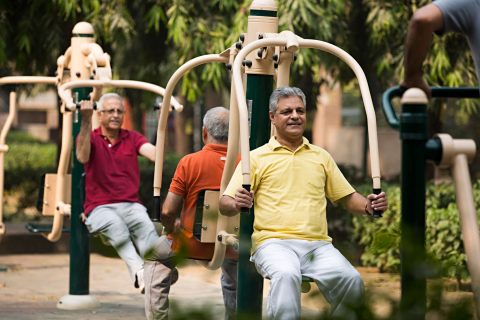As we age, our bodies undergo a series of changes that can impact our overall health and well-being. While some of these changes are inevitable, there are steps we can take to ensure that we live longer and in better health. In today’s blog post, we will explore the six key shifts needed for healthy ageing.
So, what are these six shifts needed for healthy ageing? Well, they encompass various aspects of our lives, from physical health and nutrition to mental well-being and social connections. By making small but meaningful changes in these areas, we can significantly enhance our overall health and happiness in our later years.
In this blog post, we will delve into each of these shifts in detail, providing practical tips and guidance on how to incorporate them into your daily routine. We’ll talk about the importance of regular exercise and staying active, the role of a well-balanced diet in maintaining optimal health, strategies for reducing stress and improving mental well-being and memory loss, as well as the significance of social interactions and community engagement.
Living longer in better health is not an unattainable dream – it’s a goal that can be achieved through conscious effort and a commitment to self-care. By understanding the key shifts needed for healthy ageing and implementing them into your daily life, you can enjoy a more vibrant, fulfilling, and independent journey through your golden years.
So without further ado, let’s dive into the six shifts needed for healthy ageing and discover how you can make positive changes today for a healthier tomorrow.

Alt text – 2 elders going for a jog and getting their regular exercise done.
Nourishing your body and mind
As we age, taking care of our bodies becomes even more crucial. Incorporating healthy habits into our daily routine can significantly impact our overall well-being. Here are a few tips to help you age gracefully and maintain good health:
1. Eat a balanced diet:
A nutritious diet plays a key role in healthy ageing. Include plenty of fruits, vegetables, whole grains, and lean proteins in your meals. These foods provide essential vitamins, minerals, and antioxidants that support brain health and boost your immune system.
2. Stay hydrated:
Drinking an adequate amount of water is essential for proper bodily functions. Aim to drink at least eight glasses of water each day to stay hydrated and maintain optimal organ function.
3. Exercise regularly:
Engaging in physical activity not only keeps your body fit but also improves cognitive function and mood. Incorporate activities like walking, swimming, or yoga into your daily routine. Remember, it’s never too late to start exercising – even gentle movements can have significant benefits.
Keeping your mind active
Ageing doesn’t mean you have to slow down mentally. Maintaining an active mind is just as important as staying physically fit. Here are a few ways to keep your brain sharp and engaged:
1. Engage in mental stimulation:
Challenge your brain with puzzles, word games, reading, or learning new skills. These activities stimulate neural connections and promote cognitive health.
2. Socialize regularly:
Strong social connections have been linked to better cognitive function and emotional well-being. Make time for family and friends, join clubs or community groups, and engage in meaningful conversations.
3. Embrace lifelong learning:
Never stop learning! Take up a new hobby or enrol in classes that interest you. Learning stimulates the brain, enhances memory, and keeps you mentally agile.
You can also benefit from finding out your cognitive age and how it compares to your actual age.
Prioritizing sleep and stress management
Quality sleep and stress management are often overlooked but play a vital role in healthy ageing. Here’s how you can prioritize these aspects:
1. Establish a bedtime routine:
Create a relaxing pre-sleep routine to signal your body that it’s time to wind down. Avoid electronic devices before bed, ensure your sleeping environment is cool and comfortable, and establish regular sleep-wake patterns.
2. Practice stress-relief techniques:
Chronic stress can negatively impact both physical and mental health. Engage in activities like deep breathing exercises, meditation, or gentle stretching to help manage stress levels effectively.
Emotional well-being matters
Maintaining emotional well-being is an essential component of healthy ageing. Here’s how you can nurture your emotional health:
1. Cultivate positive relationships:
Surround yourself with supportive and positive individuals who uplift your spirits. Nurture these relationships by spending quality time together, expressing gratitude, and providing emotional support.
2. Practice self-care:
Make self-care a priority. Engage in activities that bring you joy, whether it’s taking a nature walk, indulging in hobbies, or practising mindfulness exercises.
Regular health check-ups

Regular check-ups with healthcare professionals are crucial for proactive healthcare management. Here’s why they are important:
1. Early detection of health issues:
Regular screenings and check-ups help identify potential health issues before they become more severe. This allows for early intervention and better treatment outcomes.
2. Medication management:
Healthcare professionals can review your medications regularly to ensure their effectiveness and minimize potential interactions or side effects.
Foster a positive outlook on ageing
Lastly, adopting a positive outlook on ageing can have a profound impact on your well-being:
1. Embrace your age:
Celebrate the wisdom and experiences that come with age. Focus on the positives and the opportunities that each day brings.
2. Stay connected with loved ones:
Maintain strong relationships with family and friends. They provide support, understanding, and companionship on your ageing journey.
Remember, healthy ageing is within reach for everyone. By making small but significant shifts in our habits and mindset, we can live longer and healthier lives. Start implementing these tips today and embrace the joy of ageing gracefully.
Conclusion:
In conclusion, embracing the changes needed to live longer in better health is a journey worth taking. We have explored the six key shifts necessary for healthy ageing: maintaining a balanced diet, staying physically active, nurturing social connections, managing stress, getting quality sleep, and keeping our minds sharp. By incorporating these shifts into our daily lives, we can significantly improve our overall well-being as we age.
Remember, it’s never too late to make positive changes. Whether you are just starting your healthy ageing journey or have been on it for a while, every step counts. By prioritizing our health and making conscious choices, we can enjoy an active and fulfilling life well into our golden years.
If you feel inspired to take action after reading this blog, consider exploring the resources available to you. At Live Ivory, we offer various tests that can help you gain valuable insights into your neurological condition. These tests can provide you with a better understanding of your brain health and guide you towards personalized strategies for healthy ageing.
So why wait? Take charge of your health today and embark on a path towards living longer in better health. Visit LiveIvory.com to learn more about how we can support you on this journey. Remember, together we can make positive changes and create a brighter future for ourselves and our loved ones.
Stay curious, stay proactive, and keep embracing the shifts needed for healthy ageing. Your well-being deserves nothing less!
“Learn more” at liveivory.com




